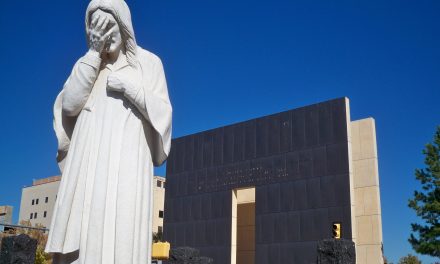(NB: This is a homily given once previously ten years ago, in 2001)
Lesson: Ecclesiastes 3:18-22, Psalm 104: 10-30 (selections)
It is my pleasure and honor to address you on this beautiful day. It is my first opportunity to speak to such a diverse, beautiful and gifted audience as you are. Of course, you may not understand everything I have to say, but perhaps your human companions and masters can somehow further communicate the few words I want to share.
I have three points. First, I want to tell you why we bless you. Second, I want to remind you that you share the same basic purpose for your lives that we humans have — we are all called to glorify God in our very lives. Third, I want to thank you for ways in which God uses you to reveal God’s very self to us.
First, I want to speak about blessing. I speak to you today to say why it is we have come to bless you. I cannot hope to articulate all of the reasons we bless you, but I will try to share with you a few reasons.
We bless you for the same reason we bless ourselves or bless one another, and similarly receive a blessing from our priest or minister or fellow believer.
In receiving a blessing, we humans are being told that we are holy and beloved by God. So too, when you are blessed, you are being told by God that you are holy and loved by God.
So we come to bless you today because you too are beloved creatures of God. The Scriptures we have read this afternoon remind us of that, though I daresay we too often fail to notice how God indeed cares for you. As the Psalmist says, you all are an expression of God’s wisdom. Each cat, each dog, each sheep each iguana — each of YOU here has been created by our loving heavenly God, and each of you, whether you are a rabbit, or a sheep or a horse, you reveal something of our Creator in all your being.
Second, I want to speak about what you all have in common with each other, and have in common with us human animals. The writer of Ecclesiastes draws of number of parallels between your lives and those of your human masters and companions. Like human animals, God has created you out of the dust, and to dust you will return. The writer of Ecclesiastes seems to think that if human animals can hope for an afterlife so can you. However, perhaps the most important thing that you share with human animals is that you have been created to glorify God
in your very being. If you are a cat, you glorify God by your cat-ness, being what God has created you as a cat to be. If you are a dog, you glorify God in your living as a dog. In the same way I, a human animal, glorify God by being the kind of human animal God creates me to be.
I am sorry to say that this is a fundamental truth about who you are that many of my fellow humans — and I am sometimes guilty of this too — fail to realize. Your existence, and that of all your fellow animals, as well as the lives of myself and all other humans, is fundamentally ordered to glorifying God. By living your lives as dogs, or as iguanas, or rabbits, or cats, you glorify God, you give pleasure to your Creator.
So I apologize on behalf of myself and my fellow human beings that all too often, we forget that the ultimate purpose of your lives is not to assist us, to keep us company, to amuse us, or even to feed us. Your lives have their worth in God’s love and concern and purposes for you.
I would like to be able to say more about the purposes that God has for you, but they are largely a mystery to me. And besides, it would be incredibly presumptuous of me to think I could say anything insightful about all the diverse ways that each of you, in your daily activities, reveal the glory of God. For example, I confess I can’t begin to elaborate the various ways in which Thelma and Louise, the two calico cats with whom I have shared an apartment for six years, glorify God in their feline lives. So much less can I begin to elaborate the purposes of many of your whom I have not even met. While I confess my lack of understanding of your lives, one thing is clear. That your strangeness, your otherness is a great reminder to us humans of the great and marvelous riches of Our shared Creator.
And this brings me to my third point, that we humans thank you and bless you for the ways in which you reveal God to us. You do so in at least two distinct ways.
First of all, we humans often have a particularly difficult time coming to terms with the fact that like you, we are creatures. We humans often have a difficult time accepting who we are. And when we humans question our God, question his designs and purposes, God often helps us understand by pointing towards you all, and saying, in effect to us uncomprehending humans — I’m like this mother hen in this way, I’m like that lamb in that way, I’m like this dolphin in this way, I’m like the pelican in that way.
Sometimes God has to remind us human beings that your relationship with God is beyond our human comprehension, as God tells Job when Job questions God’s ways. God reminds Job of how little we humans know of God’s ways. There God tells you horses that God gives you your might, God tells brother raven that his food comes from God, God tells the sister hawk and brother eagle that their flight is God’s gift to them to use to display God’s majesty.
In response to this, Job can only say, “God, your ways, your doings, your creatures are too wonderful for me.” Job once again rightly stands in awe of the various gifts God has given to each of you. And so we too stand in awe of the various gifts God gives to you which have not been bestowed on us humans. You dogs amongst us, you teach us fidelity, as well as what it is to smell well. You birds, you show us simplicity, as well as graceful flight. You horses, you show us gentleness, as well as speed. You cats amongst us, you not only incite us to curiosity, but your
sight is an amazing gift.
Secondly, fellow creatures, God uses you to reveal God’s very self to us humans. Throughout much of Christian history, the incomprehensible ways of God have been communicated by great artists by looking to some of you. I will give only four examples:
In St. Peter’s Basilica in Rome, you dogs personify “fidelity” to us.
You doves, with your qualities of peace, simplicity, patience and purity, symbolize and help the rest of us creatures grasp, if only in a faint way, the holy spirit.
You pelicans, you have personified Our Lord Jesus Christ in one of the most beautiful yet relatively unknown accounts that have been passed down to us. From early Christian times, an ancient story was adopted in which the pelican, in seeing its babies dead, cries aloud with grief and bending over their bodies, tears his breast with his beak so that his blood pours over them. Under this warm shower, very soon the dead baby pelicans begin to stir and come back to life, beating their wings joyfully and burrowing into their father’s downy feathers.
From earliest Christian art, this was understood to be a symbol of the relation between God and humans. Like the pelican’s young, the human race is dead to the life of the spirit. The Savior pours his blood over humanity, purifying it by his sacrifice, and gave it back true life. Countless Christian thinkers, including St. Albert the Great, St. Thomas Aquinas and Dante all understood the story of Pelican to be revealing this sacred truth.
But perhaps the creature who has most famously revealed the truth of God to us humans, the most popular symbol for Christ, is the lamb. From the earliest days of Christianity in the catacombs, long before Christians dared to show a cross, the lamb was the dominant symbol of Christ. The lamb was the symbol chosen to take its place. It was, we might say, the first crucifix, or the pre-crucifix.
Today, Christ is our Passover lamb. In the Eucharist we eat of the divine lamb. In the book of Revelation, St. John has the believers following in the footsteps of the lamb.
In all of these examples I have only begun to say a little of the gifts you offer to God, and that is of course all I can hope to do. So today we bless you in recognition of your holiness and being loved by God. In doing so we recognize that this world is yours as well as ours, because God has put you here, and that is the only rationale for your existence that you need. Finally, we bless you in recognition that you reveal God to us in ways we only begin to comprehend, and remind us in sometimes difficult and painful ways that we are not at the center of the universe. Like you, we are God’s creatures. Thank you and God bless you.
©2001 by Dr. John Berkman. All rights reserved.



